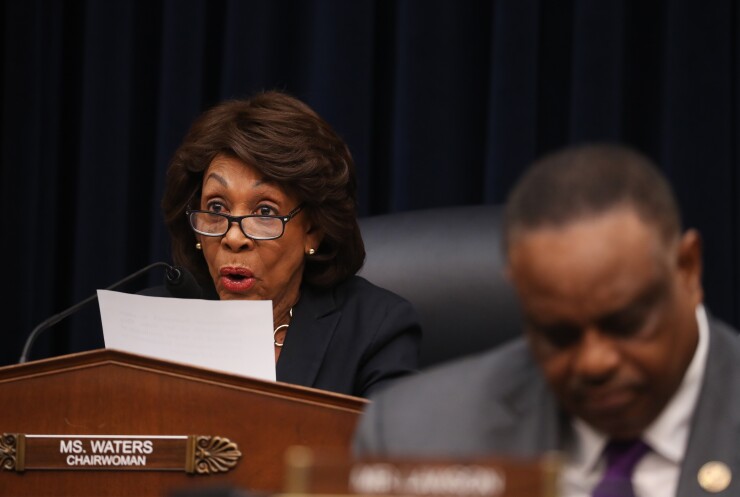WASHINGTON — A bill to reverse Trump administration efforts to weaken the Consumer Financial Protection Bureau passed the House of Representatives along party lines.
The House passed the Consumers First Act in a 231-191 vote, with all Democrats supporting the legislation and all Republicans opposing it. The bill would limit the number of political appointees the CFPB can hire, restore supervision and enforcement authority in the agency’s fair-lending office, and resume supervision for the Military Lending Act, among other things.
House Financial Services Chairwoman Maxine Waters, D-Calif., championed the legislation, which passed late Wednesday, as an effort to reverse actions by former acting CFPB Director Mick Mulvaney. Mulvaney hired roughly a dozen political appointees to lead the CFPB’s offices, attempted to rebrand the agency with a new title and pulled back on some of the bureau's enforcement activities, among other things.

The agency is currently led by Kathy Kraninger, a Trump appointee who has emphasized education and preventing consumer harm, rather than the strict enforcement regime that the agency maintained under the Obama administration’s former director, Richard Cordray.
But the bill is unlikely to pass the Senate, which is controlled by Republicans who were critical of the agency under Cordray. Bills have been introduced by Republicans to completely dismantle the agency, while others have suggested changing its structure to a five-member bipartisan commission rather than a single-director leadership structure.
Rep. Patrick McHenry, R-N.C., the ranking member of the House Financial Services Committee, said Democrats voting in favor the bill have “buyer’s remorse” for creating an agency through the Dodd-Frank Act that is unaccountable to Congress.
“They have buyer’s remorse,” McHenry said. “Unfortunately, they’ve decided to advance legislation that does nothing to create a more responsible CFPB over the long term. Instead of taking this opportunity to work together to bring transparency and accountability to the CFPB, the majority is moving a bill that does little more than advance their political agenda and micromanage the bureau.”





